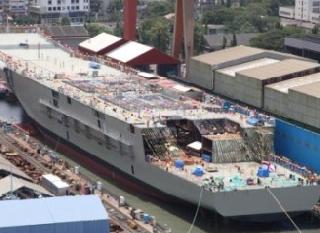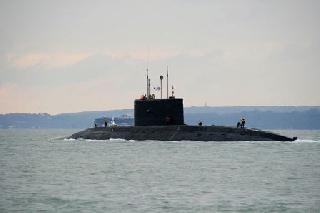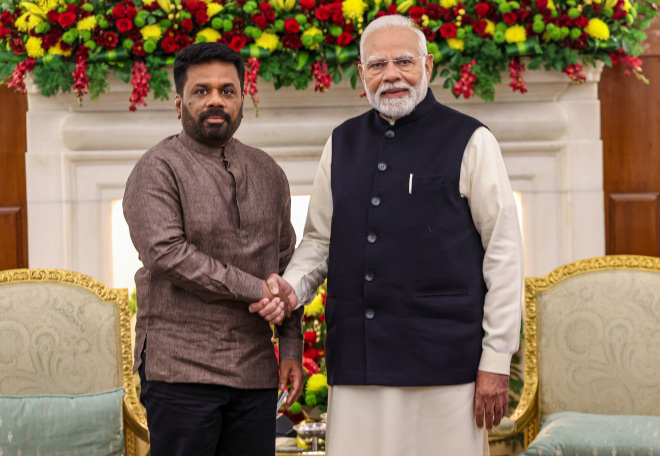
INS Vikrant at the dockyard. An Indian Navy photo
BEIJING (PTI): Acknowledging that India has taken a lead over China in launching an indigenously built aircraft carrier, the Chinese state media has said INS Vikrant would not lead to Sino-Indian arms race nor it would "create any waves" for cooperation between the two countries.
"China is a late comer among big powers in terms of developing domestic aircraft carriers. Even India has moved ahead of us," an editorial in the state-run Global Times said, making a strong case for Chinese military to develop aircraft carriers to add to the first one launched last year.
A commentary by official Xinhua news agency ruled out any arms race as a result of the launch of Vikrant.
"Pundits obsessed with geopolitical rivalry wasted no time in hyping the Indian feat as a threat to China, fanning speculations the two Asian neighbours would slide deeper into an arms race aimed at regional supremacy," it said.
"However, such conflict-obsessed fear-mongers have apparently ignored the larger picture. For starters, China and India, the world's top two developing countries, have vast interests in common."
"It is true India, already a regional heavyweight, has always held the dream of becoming a global power. It has been the world's largest importer of weapons over the past few years," it said.
"Doomsayers also point to the high-profile support from the United States, which they assume is bent on containing China's rise," it said referring to the visit of US Vice President Joe Biden during which he suggested India to play a bigger role in the Asia-Pacific region.
"Underneath the gloomy prophecy also lies the increase in the number of carrier-equipped naval forces in the region.
Just days before the Vikrant's launch, Japan launched a new helicopter carrier," it said.
"However, the normal buildup of defence capabilities is no cause of worry. China and India are important trading partners, and they hold identical or similar stances on a wide range of regional and global affairs. They have also recognised the world is large enough to accommodate the development of both of them," it said.
The two countries should have the vision to look beyond slanted interpretations and stick to the right path of cooperation, it said.
"With the Asia-Pacific region gaining more weight in the global landscape, their cooperation is particularly necessary.
Joining hands, they can make more contribution to the peace and prosperity of not only the region but also the world at large," it said.
The Global Times in its editorial pointed out that China's much publicised DF-21D "carrier-killer" missile which raised concerns in US defence circles has not yet been tested to meet the threat of the carriers.
Previous reports in the American media said US officials were worried about the "carrier-killer" developed by China as it could target the aircraft carriers from a long distance.
"If the US' aircraft carriers cruise into the first island chain at sensitive time, it could still create some waves.
China's DF-21D 'carrier-killer' missile wouldn't yet be a factor to consider in that situation, given the fact it has not yet been tested," it said.
This the first time official media commented on the missile.
It also said China should "speed up the construction of the domestic carriers" to retain the strategic initiative.
"China should speed up its construction of domestic aircraft carriers. India's actions remind us that the strategic significance of developing aircraft carriers in Asia is not declining," it said.
"Rather, they are one of the most effective strategic tools in maintaining national maritime interests. The earlier China establishes its own aircraft carrier capabilities, the earlier it will gain the strategic initiative," it said, emphasising on the ability of the carriers to bring about a "strategic deterrence".
But at the same time Vikrant launch was not "sensational" for China compared to the helicopter carrier launched by Japan last week.
"The waves caused by India's aircraft carrier launch haven't been as sensational as those caused by Japan's light carrier the Izumo among Chinese," it said.
"India has adopted a different attitude than Japan toward territorial disputes with China. Meanwhile, India's overall national strength lags behind that of China. Therefore, China perceives Japan rather than India as its biggest neighbouring threat," it said.
The editorial also said the launch of Vikrant has showed that about the importance of aircraft carriers.
"Recent theories which state that aircraft carriers are useless in the 21st century are not empty rhetoric. Aircraft carriers may not be the final means which major powers resort to using during confrontations," it said.
"But international politics is full of frictions of varying intensity. Not all conflicts begin with arms," it said.
The launch of Vikrant has been highlighted by the print and television media in China, projecting it as Indian navy taking a lead over that of China's.
"The aircraft carrier will not break the military balance in Asia, because the main interests for India lies in the Indian Ocean while China, a big power in Asia, has no conflict of interest with India in this area," Yin Zhuo, a military expert from the Chinese Navy Advisory Committee for Informatisation, told the daily.
 Previous Article
Previous Article Next Article
Next Article













The Indian Air Force, in its flight trials evaluation report submitted before the Defence Ministry l..
view articleAn insight into the Medium Multi-Role Combat Aircraft competition...
view articleSky enthusiasts can now spot the International Space Station (ISS) commanded by Indian-American astr..
view article